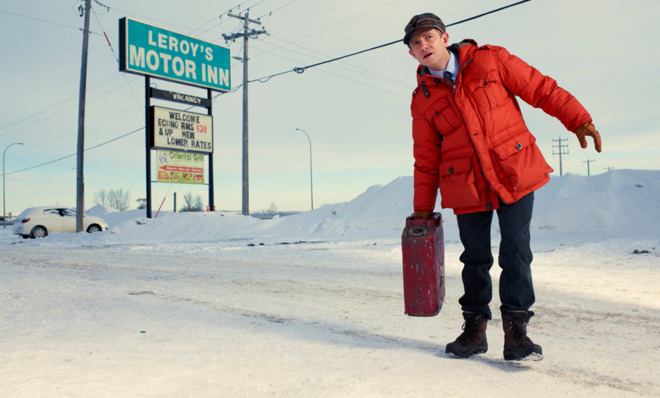A Minnesotan's guide to Fargo
Does the impressive new FX series double down on the stereotypes established in the Coen brothers' original film? You betcha.


A free daily email with the biggest news stories of the day – and the best features from TheWeek.com
You are now subscribed
Your newsletter sign-up was successful
Tonight, FX is set to premiere a limited, 10-episode series based on the Coen brothers' legendary 1996 film Fargo, which scored with audiences and critics alike by infusing a twisty neo-noir narrative with a healthy dose of Minnesota nice. Having seen a few episodes, it's clear that the Fargo series is more than a mere cash grab attempting to capitalize on the movie's legacy; this is a smart, beautifully acted miniseries that honors its source material while carving out some new ground in the crowded TV landscape.
Some critics have lavished praise on the new series; others have been more skeptical. But however audiences respond to this small-screen version of Fargo, there's one place where it's guaranteed to have a unique impact: Minnesota.
Full disclosure: I grew up in White Bear Lake, a self-described "city of lakes and legends" that's roughly 15 miles outside the Twin Cities area. On the rare occasion when I meet a non-Minnesotan who has heard of the town where I grew up, it's generally thanks to Fargo, which includes a memorable scene in which a prostitute explains that she went to high school in White Bear Lake (and throws in a proud "Go Bears!"):
The Week
Escape your echo chamber. Get the facts behind the news, plus analysis from multiple perspectives.

Sign up for The Week's Free Newsletters
From our morning news briefing to a weekly Good News Newsletter, get the best of The Week delivered directly to your inbox.
From our morning news briefing to a weekly Good News Newsletter, get the best of The Week delivered directly to your inbox.
Believe it or not, that honorary mention is nowhere to be found on the city of White Bear Lake's official website.
Fargo's quality and specificity means that it has endured as pop culture's defining depiction of Minnesota. I now live in New York City — a place that has been so thoroughly explored in popular culture that a viewer could plausibly see Girls' Hannah Horvath getting tested for HPV in a Brooklyn doctor's office less than 24 hours after they saw the Avengers fending off an alien attack in Times Square. But for Hollywood, Minnesota was (and remains) largely uncharted territory, which meant that the Coen brothers' Fargo all but defined it in the mind of anybody who has never been to the state.
And even though it's been more than 20 years since Fargo hit theaters, there's still plenty of grumbling among Minnesotans about the thick accents and aw-shucks naïveté of the film's characters. Of course, there's also a certain amount of grudging pride: Fans of the movie can visit the Fargo-Moorhead Visitors Center to have their picture taken next to Fargo's infamous wood chipper.
That brings us to FX's Fargo, which revives and expands on the film's depiction of Minnesota. The TV Fargo is a kind of funhouse mirror version of the movie, telling a brand-new story populated with characters who bear no small resemblance to the originals. Marge Gunderson (Frances McDormand) is replaced by Molly Solverson (Allison Tolman), a cop whose disarming friendliness hides a fearsome talent for law enforcement. Jerry Lundegaard (William H. Macy) is replaced by Lester Nygaard (Martin Freeman), a hard-luck salesman whose illicit actions have far-reaching consequences he is not prepared to accept. Carl Showalter (Steve Buscemi) is replaced by Lorne Malvo (Billy Bob Thornton) as a criminal-for-hire whose crabby demeanor puts him at odds with all the Minnesota nice. Most of Fargo the movie takes place in Brainerd (pop. 13,517) and Minneapolis; most of Fargo the series takes place in Bemidji (pop. 13,723) and Duluth.
A free daily email with the biggest news stories of the day – and the best features from TheWeek.com
But if the Fargo miniseries hews a little too closely to its source material at times, it also doubles as a celebration of the Coens' entire filmography. The series finds room for existential religious philosophy, which puts it in the vein of the Minnesota-set A Serious Man. There's Billy Bob Thornton — who starred in the Coens' The Man Who Wasn't There — doing a riff on No Country for Old Men's Anton Chigurh. There's even a scene set at a bar that proudly advertises a $5 White Russian special, which would surely turn the head of The Big Lebowski's Dude. It's as if someone played Mad Libs with the plot synopses of the Coen brothers' complete filmography, built a new story around the resulting Frankenstein monster, and moved it back to where it all began: Minnesota, where the Coens came of age in a little suburb called St. Louis Park.
If the Fargo miniseries is the success it deserves to be, its impact will be felt across Minnesota, with every "geez" and "heck" uttered by its characters helping to entrench the stereotypes that the movie originally spread. I'm already gearing up for another round of people who will respond with a "you betcha!" when they hear where I'm from. Some Minnesotans will undoubtedly complain, but not too loudly; after all, that wouldn't be very nice.
Scott Meslow is the entertainment editor for TheWeek.com. He has written about film and television at publications including The Atlantic, POLITICO Magazine, and Vulture.
-
 How the FCC’s ‘equal time’ rule works
How the FCC’s ‘equal time’ rule worksIn the Spotlight The law is at the heart of the Colbert-CBS conflict
-
 What is the endgame in the DHS shutdown?
What is the endgame in the DHS shutdown?Today’s Big Question Democrats want to rein in ICE’s immigration crackdown
-
 ‘Poor time management isn’t just an inconvenience’
‘Poor time management isn’t just an inconvenience’Instant Opinion Opinion, comment and editorials of the day
